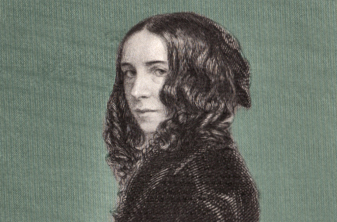
In the letter below, an exuberant Elizabeth Barrett Browning writes to Robert Browning, who she would marry the following year. Elizabeth Barrett Browning describes the ebbing of her depression, and, affirming the virtues of suffering, draws a parallel between her own anguish and solitude and that of Prometheus, chained to the Caucasus cliffs, caught between heroism and martyrdom.
To Robert Browning
[London]
March 5th 1845.
But I did not mean to strike a ‘tragic chord’; indeed I did not! Sometimes one’s melancholy will be uppermost & sometimes one’s mirth,—the world goes round, you know—& I suppose that in that letter of mine the melancholy took the turn. As to ‘escaping with my life,’ it was just a phrase—at least it did not signify more than that the sense of mortality, & discomfort of it, is peculiarly strong with me when east winds are blowing & waters freezing. For the rest, I am essentially better, & have been for several winters; and I feel as if it were intended for me to live & not die, & I am reconciled to the feeling. Yes! I am satisfied to ‘take up’ with the blind hopes again, & have them in the house with me, .. for all that I sit by the window. By the way .. did the Chorus utter scorn in the μέγ᾽ ὠφελημα—? [“great boon”] I think not. It is well to fly towards the light, even where there may be some fluttering & bruising of wings against the windowpanes!—is it not?
There is an obscurer passage, on which I covet your thoughts—where Prometheus, after the sublime declaration that, with a full knowledge of the penalty reserved for him, he had sinned of free will & choice, goes on to say .. or to seem to say .. that he had not, however, forseen the extent & detail of the torment .. the skiey rocks .. & the friendless desolation. See v. 275– The intention of the poet might have been to magnify to his audience the torment of the martyrdom—but the heroism of the martyr diminishes in proportion—& there appears to be a contradiction—and oversight. Or is my view wrong? Tell me. And tell me too, if Æschylus is not the divinest of all the divine Greek souls? People say after Quintillian, that he is savage & rude,—a sort of poetic Orson … with his locks all wild. But I will not hear it of my master!— He is strong as Zeus is—& not as a boxer—and tender as Power itself,—which always is tenderest.
But to go back to the view of Life with the blind Hopes, .. you are not to think,—whatever I may have written or implied,—that I lean either to the philosophy or affectation which beholds the world through darkness instead of light, & speaks of it wailingly. Now, may God forbid that it should be so with me. I am not desponding by nature—and after a course of bitter mental discipline & long bodily seclusion, I come out with two learnt lessons, (as I sometimes say & oftener feel) .. the wisdom of cheerfulness—& the duty of social intercourse. Anguish has instructed me in joy—and solitude in society—it has been a wholesome & not unnatural reaction. And altogether, I may say that the earth looks the brighter to me in proportion to my own deprivations: the laburnum trees & rose trees are plucked up by the roots—but the sunshine is in their places—and the root of the sunshine is above the storms. What we call Life is a condition of the soul—and the soul must improve in happiness & wisdom, except by its own fault. These tears in our eyes—these faintings of the flesh, .. will not hinder such improvement!
And I do like to hear testimonies like yours, to happiness—and I feel it to be a testimony of a higher sort than the obvious one. Still, it is obvious too that you have been spared up to this time, the great natural afflictions, against which we are nearly all called, sooner or later, to struggle & wrestle—or your step would not be “on the stair” quite so lightly. And so, we turn to you, dear Mr Browning, for comfort & gentle spiriting! Remember that as you owe your unscathed joy to God, you should pay it back to his world. And I thank you for some of it already.
Also .. writing as from friend to friend—as you say rightly that we are,—I ought to confess that of one class of griefs, (which has been called too the bitterest) I know as little as you. The cruelty of the world, & the treason of it—the unworthiness of the dearest,—of these griefs I have scanty knowledge. It seems to me from my personal experience that there is kindness everywhere in different proportions, & more goodness & tenderheartedness than we read of in the moralists. People have been kind to me, even without understanding me, & pitiful to me, without approving of me:—nay, have not the very critics tamed their beardom for me, & roared delicately as sucking doves, on behalf of me? I have no harm to say of your world, though I am not of it as you see!—And I have the cream of it in your friendship, .. and a little more—and I do not envy much the milkers of the cows.
How kind you are!—how kindly & gently you speak to me!– Some things you say are very touching, & some, surprising—& although I am aware that you unconsciously exaggerate what I can be to you, yet it is delightful to be broad awake & think of you as my friend.
May God bless you.
Faithfully yours,
Elizabeth B Barrett.


